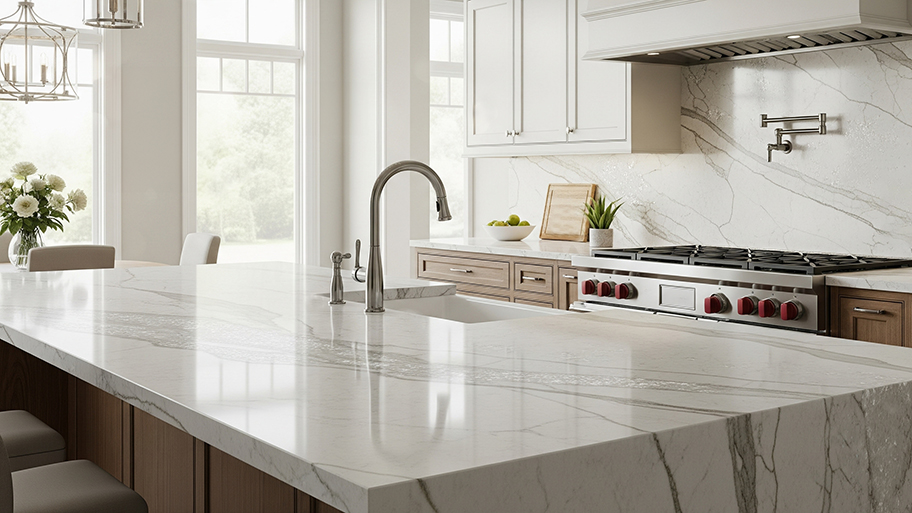
How much your quartzite countertops will cost depends on a number of factors—most prominently, the type of quartzite and the size of your counters.
Two heavyweights, one kitchen; let’s rumble


Quartz is a nonporous engineered stone that resists stains and does not require sealing.
Granite is a porous natural stone that requires regular sealing.
Both types of countertops are durable and can last for decades.
Most granite costs $40 to $60 per square foot, while quartz costs $70 to $100 per square foot.
Choosing between quartz and granite isn't easy—and you're definitely not the only homeowner struggling to decide. Both materials are durable and stylish but differ in key areas like maintenance, cost, and practicality. If you're weighing quartz vs. granite countertops, here's what to consider before picking your perfect slab.
Quartz and granite countertops are both durable countertop materials, but they are worlds apart in how they are made and maintained. Quartz is a tough, stylish, and virtually maintenance-free engineered surface. On the other hand, granite is 100% natural and prized for its unique patterns, but it demands a little more upkeep, including yearly sealing to keep it looking its best.
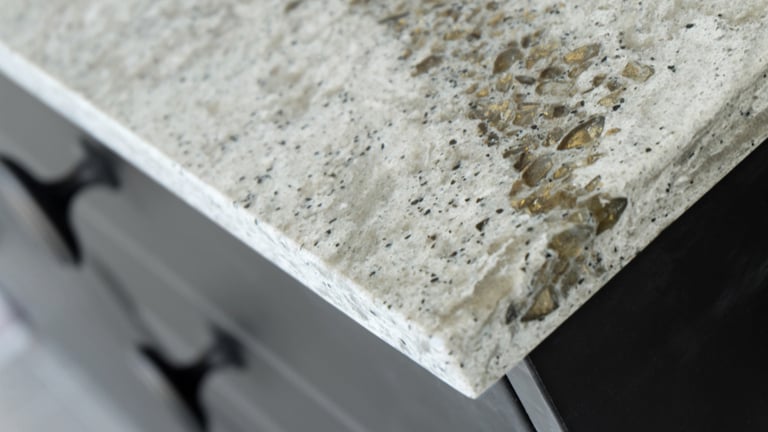
Quartz is a human-made material consisting of mostly ground natural quartz blended with polymers and resins. The result is a dense, nonporous surface resembling natural stone but with boosted durability for much easier care. Since it is engineered, homeowners will find quartz in a fantastic range of consistent patterns and colors to work with any kitchen design.
| Pros | Cons |
|---|---|
| Heat-resistant | Not heatproof |
| Nonporous | Not for outdoors |
| Wide range of styles | Can be pricey |
| Stain-resistant | Heavy and difficult to install |
Best for:
Busy kitchens that need low-maintenance surfaces
Households that want stain-resistant, nonporous countertops
Homeowners who prefer consistent color and pattern options
Quartz combines form and function with minimal upkeep. To kick things off, quartz is nonporous, so it never needs sealing, and it’s easier to clean. Even better, liquids and bacteria won't seep into the surface, which means quartz is way more hygienic than natural stone. Quartz is also stain-resistant. Spills like red wine or espresso won't leave a lasting mark, making it a worry-free option for cooking and entertaining.
Another standout feature is its heat resistance. Unlike laminate, wood, and solid surface countertops, you don’t have to sweat when placing warm items on quartz. Plus, quartz is available in many styles, including options that mimic marble, granite, or concrete, to create a uniform look across your space.
While quartz is heat resistant, it is not heatproof, so placing searing cookware right out of the oven on its surface can cause discoloration and cracking. Additionally, since it is a heavy material, you may have to reinforce your base cabinets before installing. Quartz is not suitable for outdoor use. It can fade and warp after prolonged exposure to sunlight, making it a poor choice for outdoor kitchens and barbecue areas.
Cost is another factor. Quartz tends to be more expensive than granite in many instances, increasing the cost of your kitchen remodel project. However, different factors impact what you will pay. It is always best to work with a local stone countertop installer who can give you a reliable estimate based on your location, material preferences, and kitchen size.

Granite countertops are cut from large slabs of quarried rock and polished to a smooth finish. Since they are natural, each slab is unique, with its own natural veining, speckles, and color variations. The stone is popular with homeowners who prefer a more organic, uncommon look.
| Pros | Cons |
|---|---|
| Heat-resistant | Needs sealing |
| Durable surface | Can stain |
| Unique patterns | Can chip or crack |
| Natural material | Heavy to install |
Best for:
Homeowners who want a natural, one-of-a-kind countertop
Those looking for a long-lasting, durable surface
Households comfortable with occasional sealing and regular upkeep
Granite is a staple in many busy kitchens because of its natural heat resistance, much more than quartz. Unlike some materials that can scorch or warp under high heat, granite holds up without damage, though using trivets is still a wise habit to protect the finish in the long run.
Another big plus is its durability. The stone is naturally tough, resisting scratches from wear and tear. With proper care, homeowners can expect their granite countertops to last up to a century (yes, seriously), making it a solid investment.
Then there’s the aesthetic appeal: granite is known for its unique patterns. No two slabs are exactly alike, so your countertop will be one of a kind. On top of that, granite is a natural material that appeals to homeowners who want a timeless look with real stone under the elbow.
Granite countertops are naturally porous and require regular maintenance to stay in top shape. Sealing granite once a year helps protect against stains, keeping the surface looking its best.
While the stone is highly heat resistant, the protective sealant is more sensitive. Placing hot pans directly on the countertop can damage the sealant over time. Granite is also prone to chipping or cracking if subjected to heavy impacts, especially along edges or corners, and repairs can be tricky and expensive.
Granite is heavier than quartz, which increases installation costs, especially if your cabinets need extra structural support. And while many homeowners love granite’s natural, one-of-a-kind patterns, its lack of uniformity may not appeal to those who prefer a more consistent look across their surfaces.
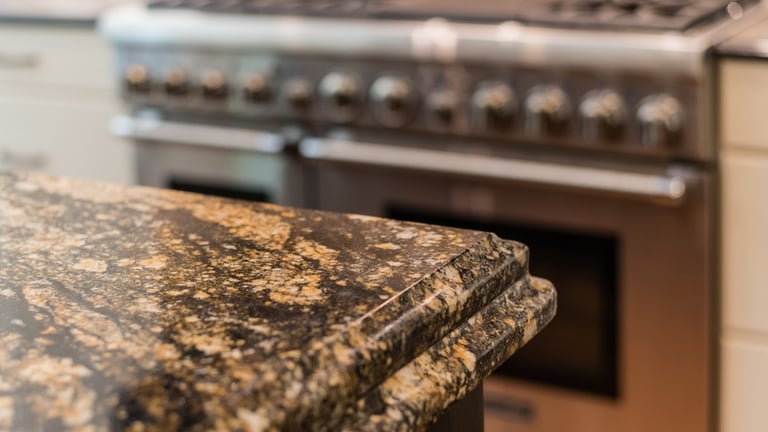
One is born in a lab, and the other is a slab from the earth. Let's compare these two countertop heavyweights in key areas like durability, maintenance, and appearance.
When it comes to appearance, quartz wins for its consistency and versatility. Because it’s engineered, quartz offers many colors and patterns, including replicating the look of many types of natural stone. That makes it easier to match slabs and achieve a cohesive design.
Granite grabs the gold belt for durability. The natural material is exceptionally hard and resists high heat like a champ. While quartz is better at resisting stains without a sealer, it is far less heat resistant.
If you want to make an investment that won't overextend your budget, granite gives you more bang for your remodeling bucks. While the amount you pay varies based on materials and your location, the average cost for granite countertops is $3,250, while quartz countertops cost $4,500.
A quartz countertop is much easier to repair than granite because it is a human-made material. Minor cracks and chips can be filled with epoxy or resin that blends in with the surface. Granite is a natural stone with unique colors and patterns, making seamless repairs more challenging.
Quartz takes first prize for ease of maintenance. Its nonporous surface shrugs off stains without the need for sealing. Just use soap and water or a cleaner made specifically for the material to clean it. While granite is super durable, it demands more TLC, such as regular sealing, to look its best and protect the surface.
Both quartz and granite are superb countertops in terms of longevity, potentially lasting for many decades. However, quartz's nonporous nature and low maintenance requirements often make it a more practical choice for homeowners seeking durability with less upkeep.
First off, quartz takes a great deal of energy to produce. However, it is a greener choice than granite. Natural stone requires quarrying, which leaves a larger carbon footprint. With quartz, you can get that organic look with less environmental guilt.
Personal taste drives ROI here. Homebuyers who prefer more modern vibes in their kitchens and want a hassle-free countertop typically prefer quartz. Conversely, just as many folks swoon over natural stone and the timeless, one-of-a-kind look it brings to spaces.
From average costs to expert advice, get all the answers you need to get your job done.

How much your quartzite countertops will cost depends on a number of factors—most prominently, the type of quartzite and the size of your counters.

The cost of soapstone countertops varies primarily based on the size of the installation area, the color of the stone, and the type of edging.
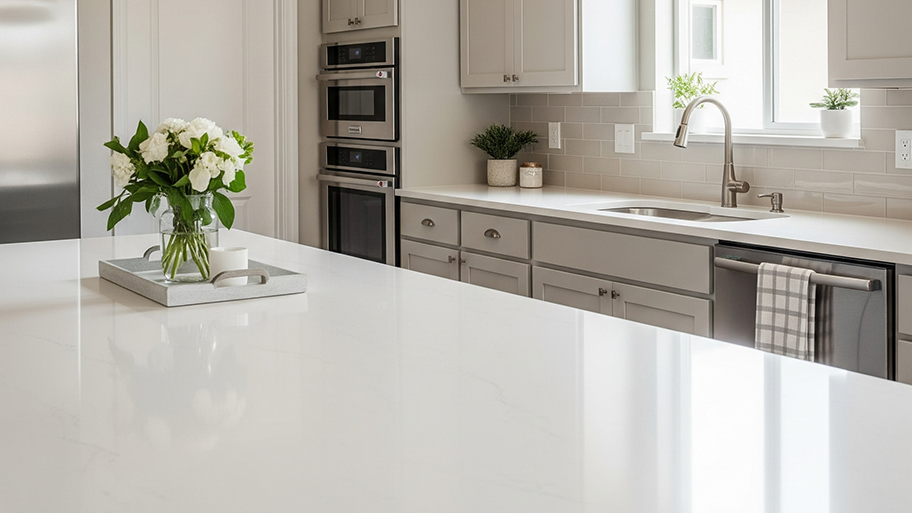
Silestone® has long been a favorite of homeowners who like the look of quartz. Budget for your Silestone® countertop’s cost with this helpful guide.

Seams in granite countertops aren’t unusual, but they can be unsightly and annoying. Learn how to avoid seams in granite countertops in your home.
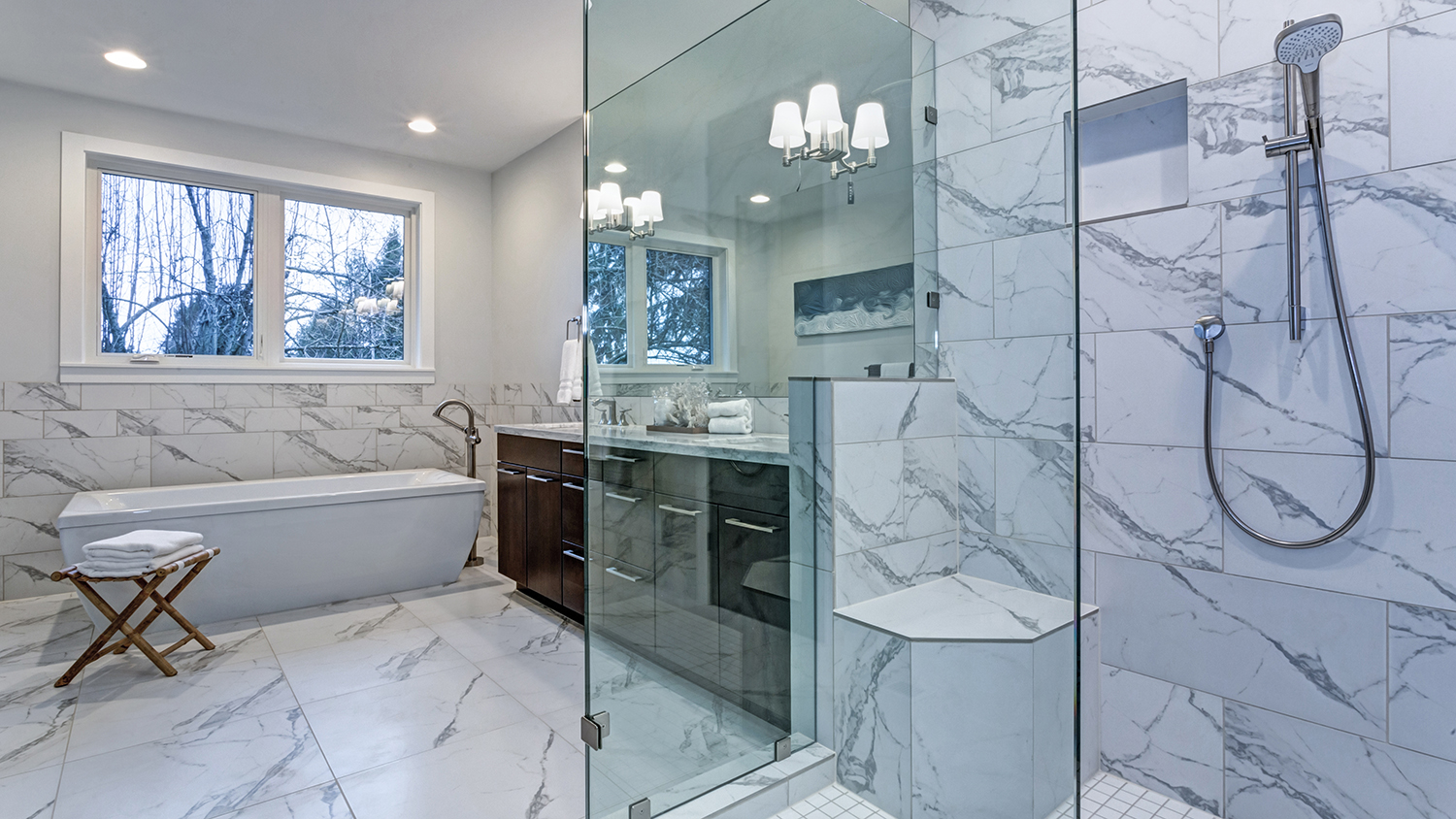
Discover the true cultured marble cost for your next project. Learn about installation, size, labor, and ways to save on cultured marble.
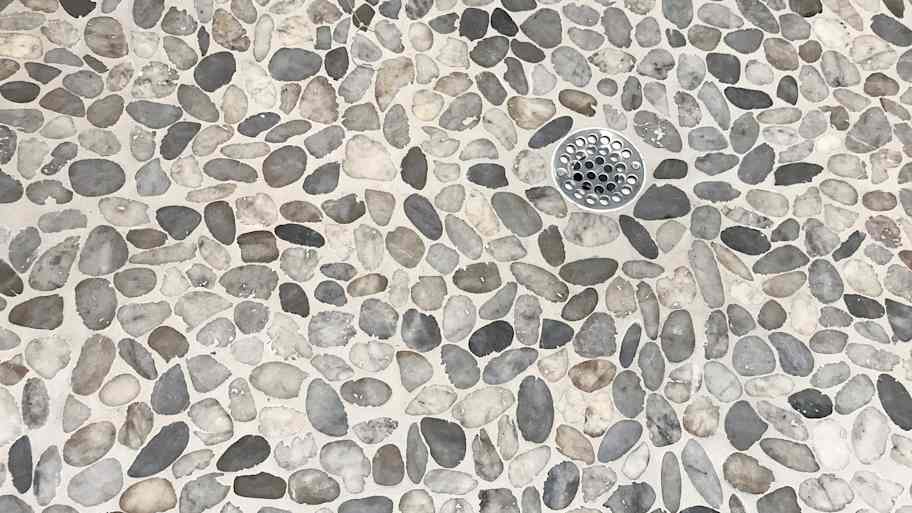
Pebble shower floors create a natural aesthetic, but they may not be safe for everyone. Weigh the pros and cons of pebble shower floors while building your shower.